by Jill & Sarah | May 12, 2018 | In The Loop
Literatura
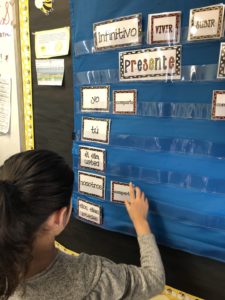
Conjugating ir verbs!
 This week we read Cuatro dólares y cincuenta centavos. Our objectives were:
This week we read Cuatro dólares y cincuenta centavos. Our objectives were:
- understand how to separate compound words in order to understand their meaning
- understand how to use and, but, and or to combine sentences
- understand how to conjugate the verb ir
- use comprehension strategies such as making connections, predicting and summarizing to construct meaning from the story
- review the comprehension skill drawing a conclusion
Matemáticas
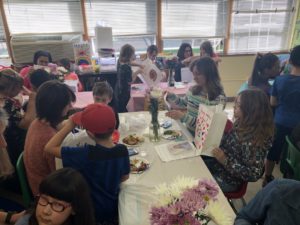
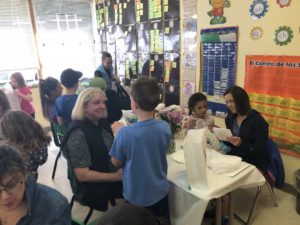
Mother’s day celebration!
This week we began our new chapter time and temperature. Our objectives were:
- add time with and without regrouping
- tell time to the minute
- read time on a digital clock
- change minutes to hours or hours to minutes
- Subtract time with and without regrouping
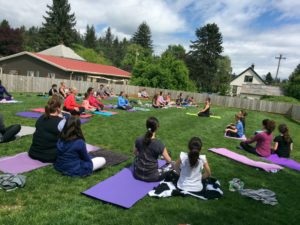 History & Geography
History & Geography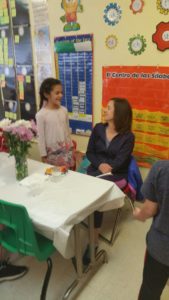
Social studies with Ms. Marci.
This week in our unit on European Exploration of North America we learned about the expeditions of Francisco Vasquez de Coronado and John Cabot. We also discussed the unit project that each student will be starting next week; working on a map, a journal entry, and a brief biography of their chosen explorer. Most of the writing for this project will be done in class though the map should be done at home.
Our objectives were to:
• identify motivating factors that led to the exploration of the Americas in different expeditions
• locate on a map or Globe key places explored and visited by the Spanish and English.
• explain the significance of Coronado in the early Spanish exploration of the Americas
• locate on a map or globe keep places explored and visited by the Spanish (the Caribbean Sea, the West Indies, Puerto Rico, Cuba, the Gulf of Mexico, the Grand Canyon, sir real Grande, and a Mississippi River)
• locate st. Augustine Florida on a map and identify it as the oldest continuously in habitat European settlement in the continental United States
• describe the purpose of missionary settlements in early Spanish exploration of North America
• describe the similarities and differences between missionaries and conquistadors
• explain why kings and queens in Europe were interested in exploring the Atlantic and the area to the west of Europe
• explain the importance to the Europeans of finding a Northwest Passage
• identify similarities and differences between John Cabot and Christopher Columbus
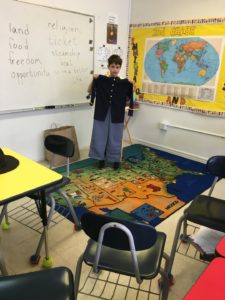
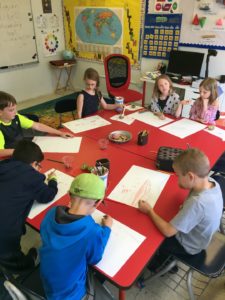 Social Studies with Ms. Laura We completed our unit on The Civil War with a review, assessment and a reading play. We also ate some food, similar to what soldiers might have consumed. Luke Wagner, from the four/five class, brought some items from his Civil War collection and spoke to us about life as a soldier and about several battles. We asked him many questions and appreciated his expertise! We started our unit on Immigration and Citizenship, talking about the reasons why people immigrated to the United States in the 1800s and 1900s. We worked on posters ‘advertising’ the great aspects of life in America.
Social Studies with Ms. Laura We completed our unit on The Civil War with a review, assessment and a reading play. We also ate some food, similar to what soldiers might have consumed. Luke Wagner, from the four/five class, brought some items from his Civil War collection and spoke to us about life as a soldier and about several battles. We asked him many questions and appreciated his expertise! We started our unit on Immigration and Citizenship, talking about the reasons why people immigrated to the United States in the 1800s and 1900s. We worked on posters ‘advertising’ the great aspects of life in America.
PROJECT ALERT: Students are asked to complete a project where they will research the life of an immigrant to The United States. This person can be a family relative, a friend, a celebrity, an athlete, or anyone who is an immigrant to our country. The students have received a guide sheet. This project, with a short presentation, will be due on Tuesday, May 29th.
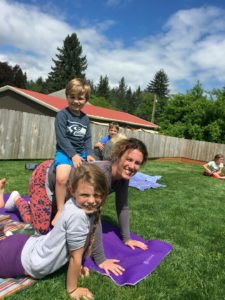 Science
Science
This week in our ecology domain we learned about food chains and food webs and began to understand energy pyramid. The students wrote about consumers producers and decomposers as well as creating their own example of a food chain.
Our objectives were to:
• describe and provide and example of a habitat
• describe how organisms in an ecosystem depend on each other and their environment
• describe what happens in a food chain
• identify the three essential Parts of a food chain: producers, consumers, and decomposers
• sequence a food chain of two or more trophic levels
• classify numbers of a food chain as producers, consumers, or decomposers
English Word Work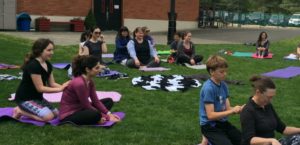
The class took our spelling test this Friday. For grammar we reviewed conjunctions. In our journals we used the word of the week “bedlam” in our entry and the saying “Touch and go” in another.
Specialists
by Jill & Sarah | May 5, 2018 | In The Loop
Literatura
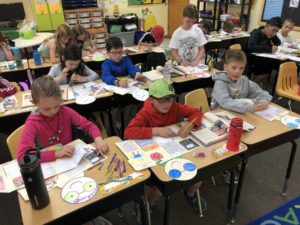
Book reports!
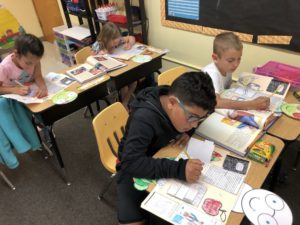 This week we completed our second book report!
This week we completed our second book report!
Our objectives were:
- Summarize a story’s plot, setting, and characters
- define vocabulary words
- write a concise description of the main character
Take a look at our Book Worm Book Reports on the bulletin board!
Matemáticas
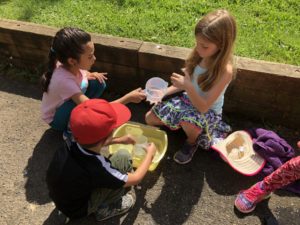
Measuring capacity!
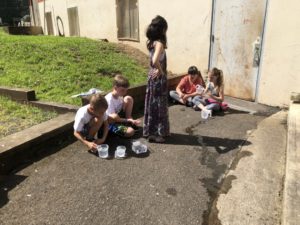 This week we finished our measurement chapter.
This week we finished our measurement chapter.
Our objectives were:
- use ounce, pound, and ton as units of measurement for weight
- read scales in ounces (oz) and pounds (lb)
- estimate and find actual weights of objects by using different scales
- use referents to estimate weight
- measure capacity with cup (c), pint (pt), quart (qt), and gallon (gal)
- estimate and find the actual capacity of a container
- relate units of capacity to one another
History & Geography
Social Studies with Ms. Marci
This week in our unit on European Exploration of North America we learned about Juan Ponce de León, Hernando de Soto, and Francisco Vasquez de Coronado. So far our gold seeking Spanish explorers have not been very popular amongst the students. We continue to define vocabulary and take notes in our travel logs throughout each lesson.
Our objectives were to:
• identify motivating factors that led to the exploration of the Americas in different expeditions
• explain the significance of Christopher Columbus and Juan Ponce de León in the early Spanish exploration of the Americas
• explain the significance of Hernando de Soto and Francisco Vasquez de Coronado in the early Spanish exploration of the Americas
• locate on a map or Globe key places explored and visited by the Spanish
• describe the encounters between early explorers and Native Americans
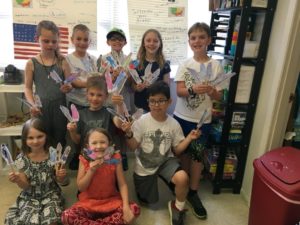 Social Studies with Ms. Laura We continued our discussion about Civil War battles and the end of the war, with Lee’s unconditional surrender to Grant. We talked about Lincoln’s assassination and how the North treated the South after the war. We discussed the meaning of Grant’s famous quote: “The war is over. The rebels are our countrymen again.” We made stick figures of some people important in the Civil War and start practicing a short play. Our review and assessment will be on Tuesday, May 8th.
Social Studies with Ms. Laura We continued our discussion about Civil War battles and the end of the war, with Lee’s unconditional surrender to Grant. We talked about Lincoln’s assassination and how the North treated the South after the war. We discussed the meaning of Grant’s famous quote: “The war is over. The rebels are our countrymen again.” We made stick figures of some people important in the Civil War and start practicing a short play. Our review and assessment will be on Tuesday, May 8th.
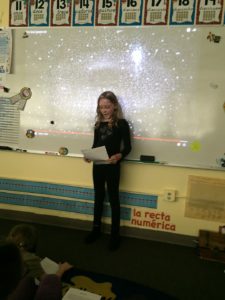
The Milky Way
Science
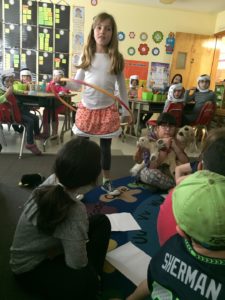
Saturn
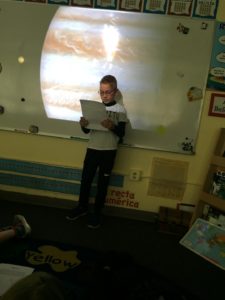
Jupiter
This week in our Astronomy science domain we had a successful blast off on Space Day. The 2/3 grade class did their celestial bodies presentations to the K/1 class and then everyone enjoyed some “astronaut” food. On Tuesday we took our unit assessment. We began our next domain on ecology this week as well.
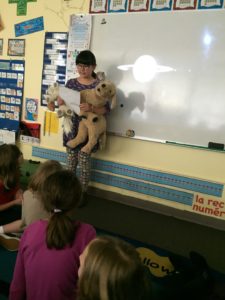
Orion
Our objectives were to:
• review for the space assessment
• explain the difference between an ecosystem and a habitat
• describe what an ecologist would study
• review what different kinds of species need in order to survive in their habitats
• identify different ecosystems that we have learned in past domains
English Word Work
The class took our spelling test this Friday. For grammar we reviewed adjectives and adverbs. In our journals we used the word of the week “amble” in our entry.
by Jill & Sarah | Apr 28, 2018 | In The Loop
Literatura
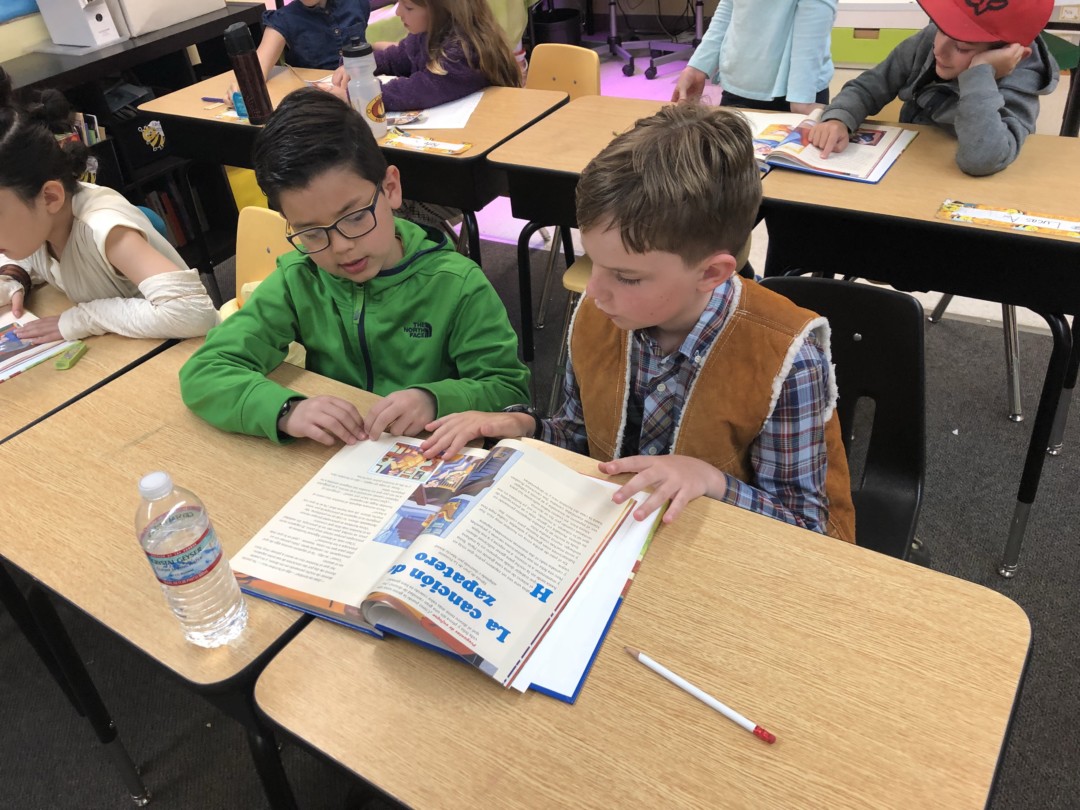
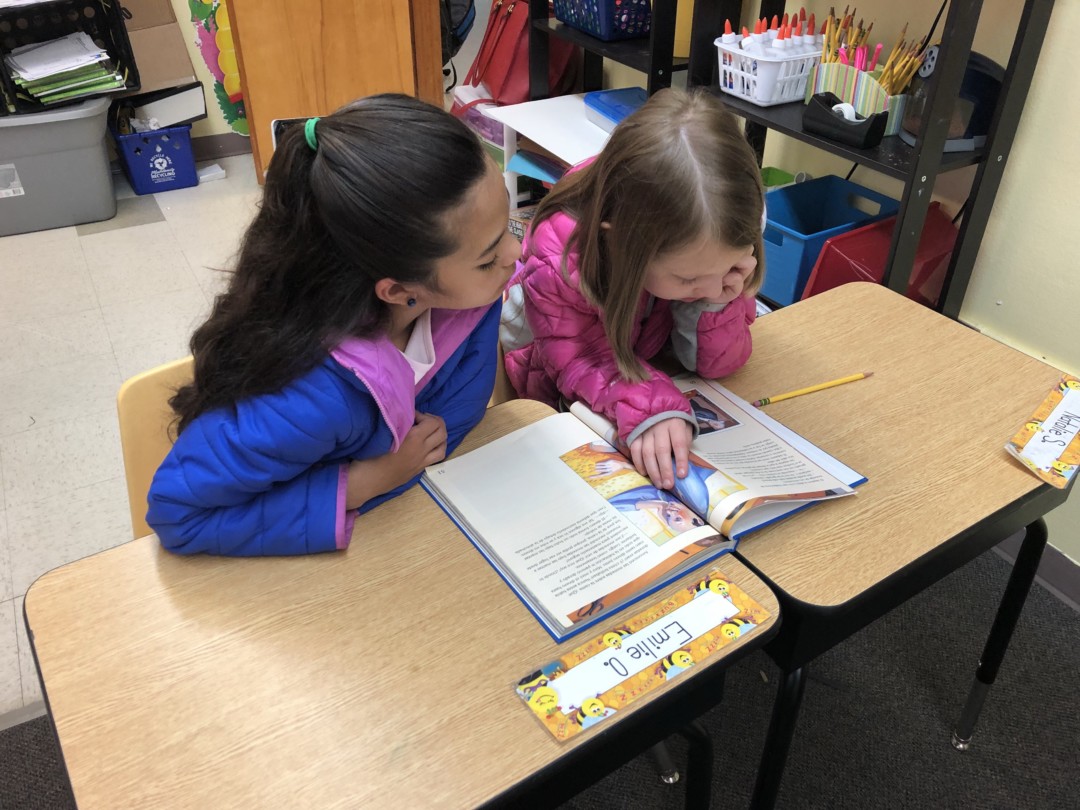 This week we read La cancion del zapatero.
This week we read La cancion del zapatero.
Our objectives were:
- to understand personal and possessive pronouns
- to use comprehension strategies such as predicting, asking questions, and summarizing to constrict meaning from the text
- To use the comprehension skill Author’s purpose as we read the story the second time
Next week we will be doing our second book report entirely in class!
Matemáticas
This week we continued working with Customary Measurement.
Our objectives were:
- Use inch, foot, yard, and mile as units of measurements for lengths
- estimate and measure given lengths
- Use referents to estimate lengths and weight
- use ounce, pound, and ton as units of measurement for weight
- read scales in ounces (oz) and pounds (lb)
- estimate and find actual weights of objects by using different scales
History & Geography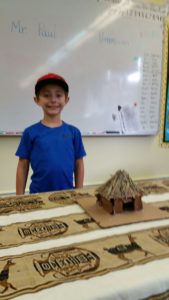
This week in our Native American unit the class did an amazing job on their projects and reports. Thank you to Paul who brought in Indian flat bread, wild huckleberry jam, local honey, and bison pemmican. The class got to hear Native American music, try the food, and design and play a tribal stick game. This week we also began our unit on European Exploration of North America.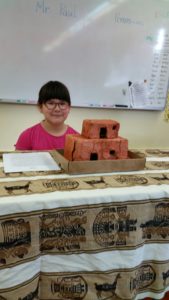
Our objectives were to:
• present our reports and projects
• explain why kings and queens in Europe were interested in exploring the Atlantic and the area to the west of Europe
• identify motivating factors that led to the exploration of the Americas in different expeditions
• explain the significance of Christopher Columbus in the early Spanish exploration of the Americas
• locate on a map or globe key places explored and visited by the Spanish
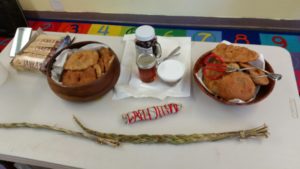 • describe the encounters between early explorers and Native Americans
• describe the encounters between early explorers and Native Americans
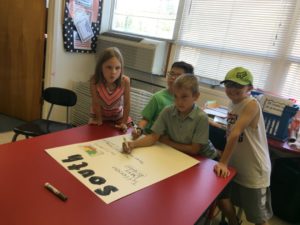
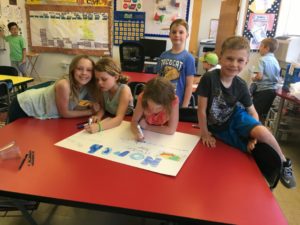
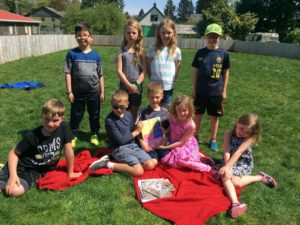 Social Studies with Ms. Laura We talked about President Abraham Lincoln’s election and his political views. We discussed which states were ‘free states’, which states were ‘slave states’. We started our posters and flags for the North and the South, comparing The Union and The Confederacy. We read Just A Few Words, Mr. Lincoln, a book about The Battle of Gettysburg and Lincoln’s Gettysburg Address. We read the ten sentence, 272 word masterpiece and compared it to other speeches given that day, one lasting two hours!
Social Studies with Ms. Laura We talked about President Abraham Lincoln’s election and his political views. We discussed which states were ‘free states’, which states were ‘slave states’. We started our posters and flags for the North and the South, comparing The Union and The Confederacy. We read Just A Few Words, Mr. Lincoln, a book about The Battle of Gettysburg and Lincoln’s Gettysburg Address. We read the ten sentence, 272 word masterpiece and compared it to other speeches given that day, one lasting two hours!
Science
This week in our science domain we learned about the life of Mae Jemison.
The class had an interesting discussion about what made her unique and how powerful following your dreams can be.
We also had a visit from Barbra and Russ. They helped us plant some seeds and talked about the growing table in our room. Just a reminder to everyone that Monday will be our space trip with the K/1 class. Our class will represent the Celestial bodies in space. Everyone should come dressed in their own representation of the ir cosmic body.
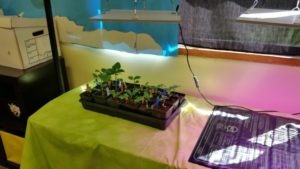 Our objectives were to:
Our objectives were to:
• describe tools and methods used to study space and share information
• identify and use vocabulary important to the process of science
• Describe the life and contributions of Copernicus
• recall key details about the history of space exploration
• Describe the life and contributions of Mae Jemison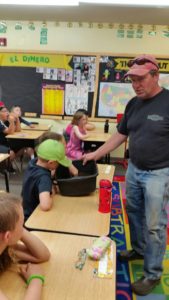
English Word Work
The class took their spelling test on Thursday. I have added No Excuse Words to all the tests. Each week there will be 3 of these words on everyone’s test. This is a way for the students to review the words that they should always spell correctly. In our journals we used the word of the week “timid” in one entry.
Specialists
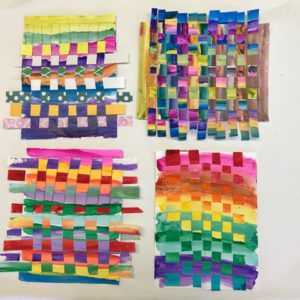 Art with Ms. Kelly: We spent the month of April working on a Weaving Project for a Mother’s Day gift. This project
Art with Ms. Kelly: We spent the month of April working on a Weaving Project for a Mother’s Day gift. This project
involved painting the Loom, putting the Warp yarn on the loom, and then weaving the Weft
yarn to create some beautiful designs. I don’t want to give you any more detail, but I know you’ll
be impressed with these beautiful weavings. All the students did a great job following directions,
choosing colors, and going “over and under” many times!
Some of the students also had time to start a paper weaving from painted paper. We’ll finish
these next month.
Music with Ms. Erin
In April we practiced singing and percussion skills, learned how to workshop songs using constructive feedback, and how to record songs. We wrapped up the songwriting project, getting final recordings of student written songs!
In May we will focus on:
- Reviewing music theory knowledge such as music notation and symbols
- Learning new symbols used in written music
- Drawing and writing notes and symbols on staff paper
- Learning about the composer Aaron Copland
by Jill & Sarah | Apr 21, 2018 | In The Loop
Literatura
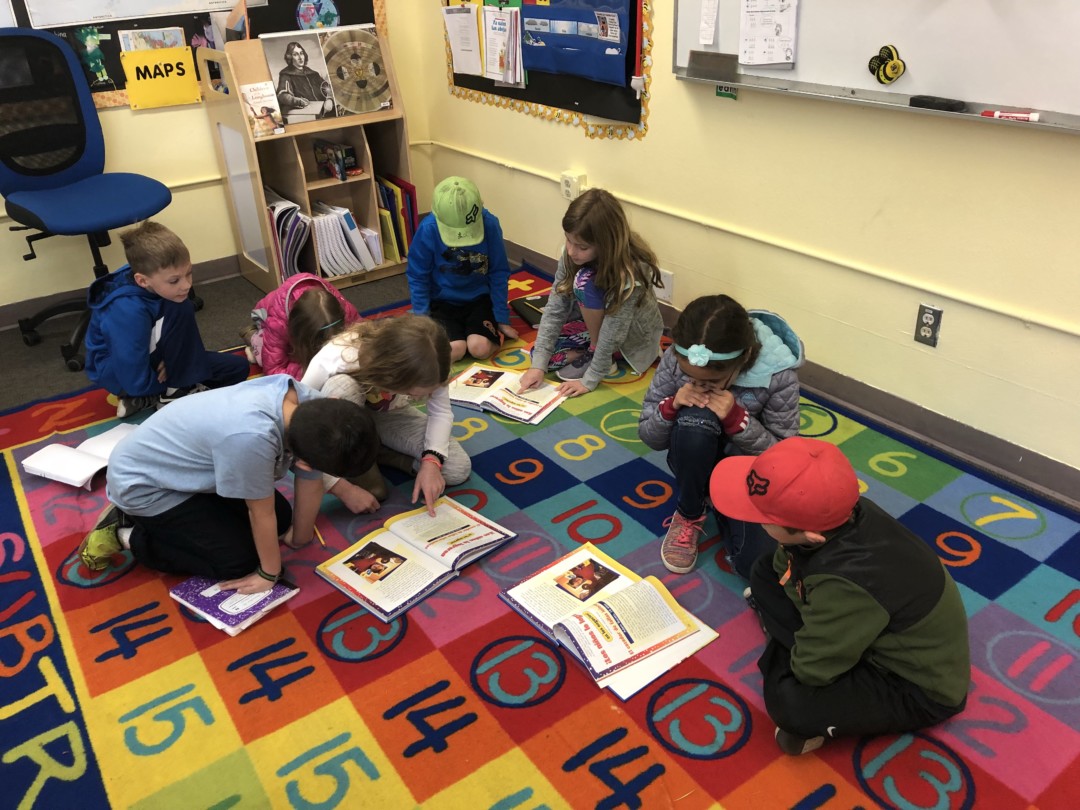 This week we read ¡Los niños lo lograron en los negocios!
This week we read ¡Los niños lo lograron en los negocios!
Our objectives were:
- understand how to use parenthesis
- understand how and when to use periods after prefixes and abbreviations
- use comprehension strategies such as summarizing and making connections to construct meaning from the text
- to use the comprehension skill Main Idea and Supporting Details as we read the story the second time
Matemáticas
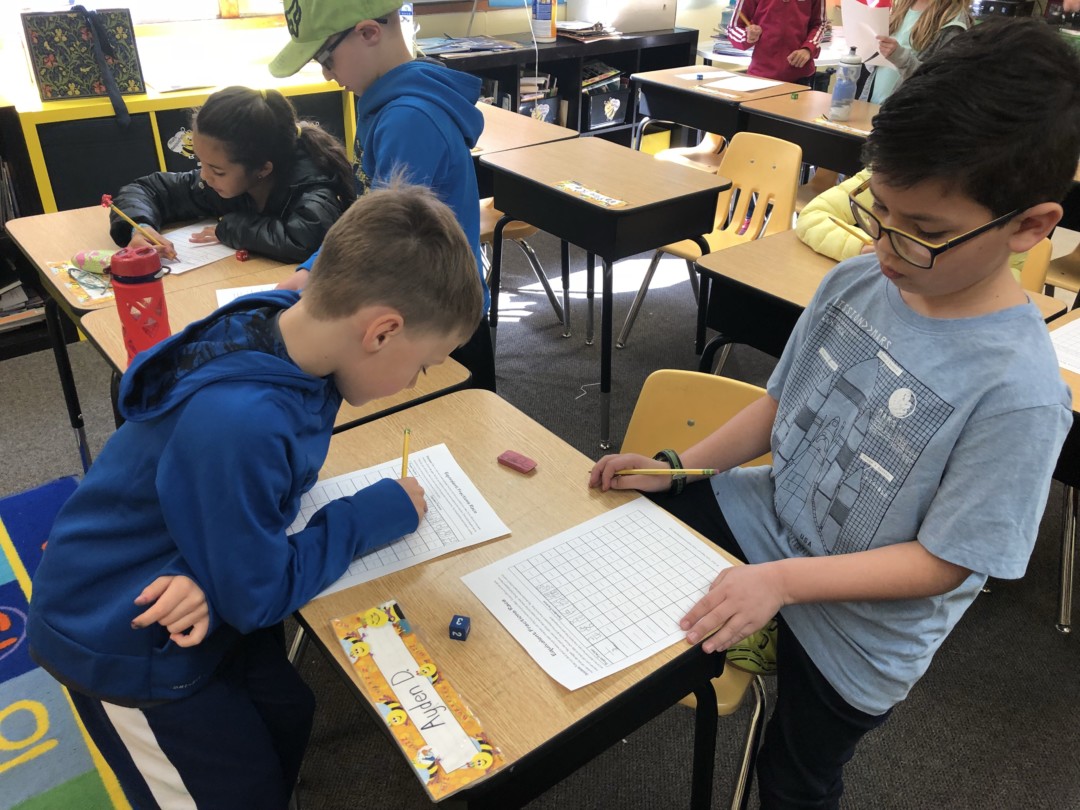
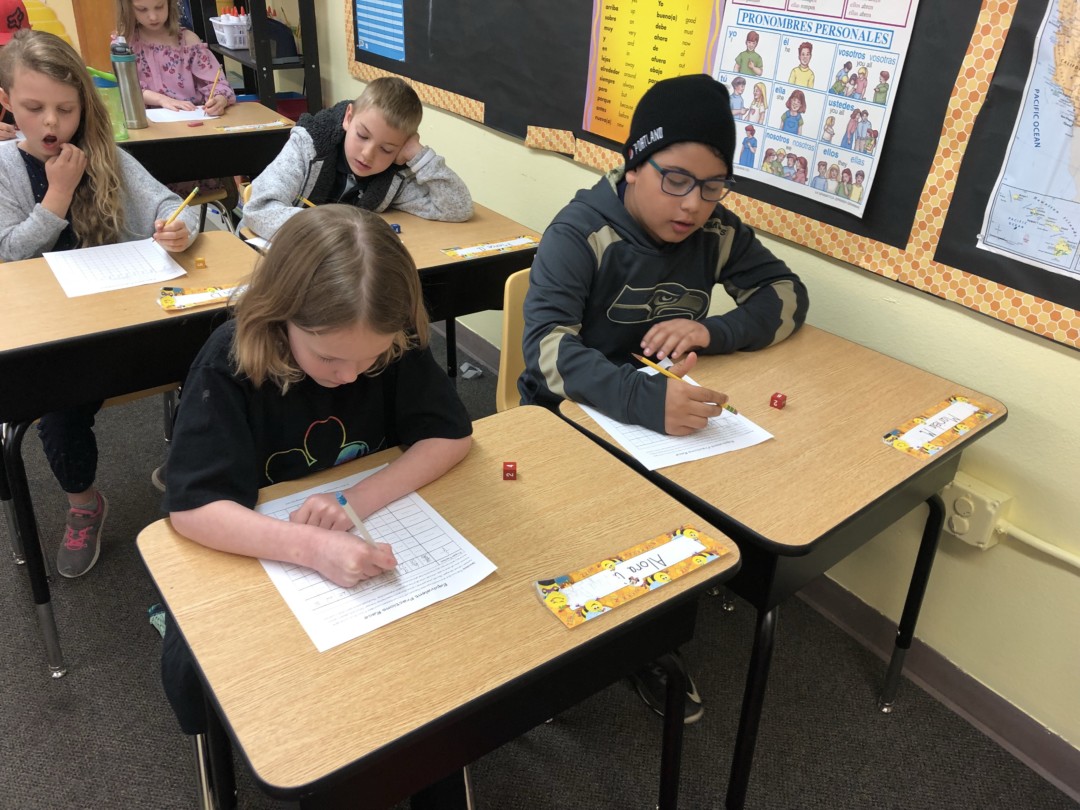 This week we finished our chapter on fractions and began our new chapter Customary Measurement.
This week we finished our chapter on fractions and began our new chapter Customary Measurement.
Our objectives were:
- Read, write, and identify fractions of a set
- find the number of items in a fraction of a set
- demonstrate how to use fractions to describe part of a whole or part of a set
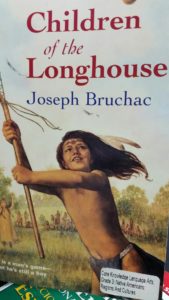 History & Geography
History & Geography
Social studies with Ms. Marci.
This week we in our unit on Native Americans: Regions and Cultures we took our unit assessment and finished working on our in class portion up the final project. The students have been working hard all week with the research, writing, and typing up there papers. We can’t wait to see all of the projects that they have worked on at home. We will have our unit celebration next Tuesday. The whole class has really enjoyed listening to the novel Children of the Longhouse,this book describes the life of a Native American boy and his twin sister centuries ago.
Our objectives were to:
• write a research paper about the tribe the student has been assigned
• review what we have learned so far
• go over expectations for the unit project.
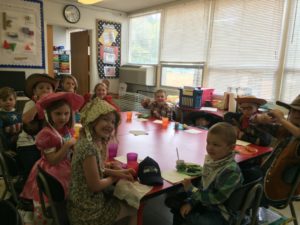 Social Studies with Ms. Laura We dressed up and completed our unit, Americans Move West, with a review, assessment and celebration. We read our play, “The Last Spoke is Driven”, after we laid our track from two directions, meeting in Utah! We started our unit about The Civil War by talking about how our United States was becoming less united. We talked about Harriet Beecher Stowe’s Uncle Tom’s Cabin and its significance around the world. We talked about Harriet Tubman and the Underground Railroad. We researched these topics on the Chrome Books after we read a book about Harriet Tubman’s life.
Social Studies with Ms. Laura We dressed up and completed our unit, Americans Move West, with a review, assessment and celebration. We read our play, “The Last Spoke is Driven”, after we laid our track from two directions, meeting in Utah! We started our unit about The Civil War by talking about how our United States was becoming less united. We talked about Harriet Beecher Stowe’s Uncle Tom’s Cabin and its significance around the world. We talked about Harriet Tubman and the Underground Railroad. We researched these topics on the Chrome Books after we read a book about Harriet Tubman’s life.
 Science
Science
This week in our science domain we learned about the life of Nicolaus Copernicus and about space exploration. Our class has been working on their space scripts for our space celebration with the K/1 class on Monday April 30. We also worked on a webbing of Nicolaus Copernicus’s live and then put it into a nonfiction narrative.
Our objectives were to:
• describe the lighting contributions of Copernicus
• identify a use vocabulary important to the process of Science
• describe tools in methods used to study space and share information
• recall key details about the history of space exploration
• explain the Pluto has been real classified as a dwarf planet
• describe the effects gravity has on earth, within the solar system, and the universe
English Word Work
The class took our spelling test this Friday. I am now testing sort words as well as 3 random “No Excuse Words” each week. In our journals we used the word of the week “jostle” in one entry and wrote a list of things to do for our environment on Earth day in another. There was no grammar this week.
Specialists
by Jill & Sarah | Apr 14, 2018 | In The Loop
Literatura

 This week we wrote a fictional story about the best Spring Break ever!
This week we wrote a fictional story about the best Spring Break ever!
Our objectives were:
- Write a fictional stories that are focused on one event (Spring Break)
- Write from their own perspective
- Plan, draft, revise, and edit stories
Matemáticas
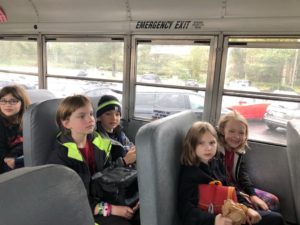
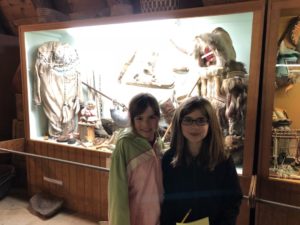 This week we continued working with fractions.
This week we continued working with fractions.
Our objectives were:
- compare and order fractions
- show fractions as points or distances on a number line
- compare and order fractions using benchmark fractions
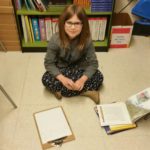 History & Geography
History & Geography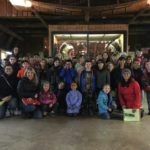
Social studies with Ms. Marci.
This week we in our unit on Native Americans: Regions and Cultures we read about the Native Americans from the Northwest region. We had a wonderful field trip to Lelooska. The whole school enjoyed hearing the legends, seeing these amazing carved masks in action, and visiting the museum for a scavenger hunt. On Thursday your child should have brought home a note explaining the unit project. The project will be due Thursday, April 24th. we will have our 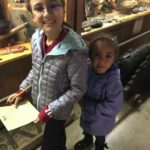 end of unit celebration on that day as well.
end of unit celebration on that day as well.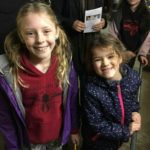
Our objectives were to:
• explain that Native Americans still live throughout North America
• locate the Pacific Northwest coast region on the map
• identify Native American tribes from the Pacific Northwest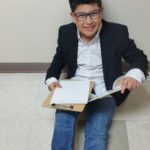
• name important foods for the coastal tribes
• describe dwellings of these tribes
• compare and contrast cultural identity of these coastal tribes to the Inuit.
Social Studies with Ms. Laura We
Science
This week in our science domain we reviewed the Big Bang Theory.
Our objectives were to:
• identify and use vocabulary important to the process of science
• explain the Big Bang Theory as an important scientific theory of the origin of the universe
English Word Work
Spelling groups got their new sorts on Monday but won’t have their spelling test until Friday, April 20. The class took a spelling assessment this Friday. In our journals we used the word of the week “thorough” in one entry and wrote about Spring Break in another. There was no grammar this week.
Specialists
Music with Ms. Erin
In March we delved into a songwriting project in which the class was divided into groups and each group worked together to write an original song. The skills that we covered in the songwriting project were:
- Choosing a subject for each song, and writing lyrics that match the subject
- Learning to rhyme, or create the sensation of a rhyme through similarity in structure and rhythm
- Creating melody for the lyrics
- How to detect plagiarism and rewrite your song to avoid it when necessary
- Choosing mood and instrumentation to complement song subject and lyric content
- Singing in tune and with the beat
- Recording “scratch” tracks (practice or test recordings)
In April we will move on to the next stage of the songwriting project, where we will be focusing on:
- Practicing singing and rhythm skills to improve the quality of song performance
- Adding new elements to the songs, including percussion and other types of instrumentation
- Workshop the songs with collaborative feedback and suggestions from the entire class
- Record our final takes on each song, getting a good finished product for each group that they will be able to share with their families
by Jill & Sarah | Mar 31, 2018 | In The Loop
Literatura
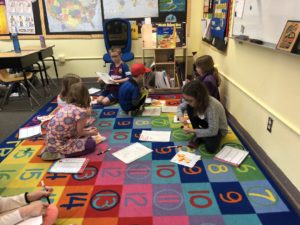
Practicing our spelling words while enjoying a snack!
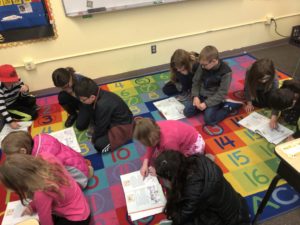
Reading our story!
This week we Alexander, que era rico el domingo pasado.
Our objectives were:
- understand how the suffix -mente changes a word to mean how something is done
- review time and order words and practice using them in sentences
- understand what the subject and predicate of a sentence are
- to use comprehension strategies such as making connections, predicting, and summarizing to construct meaning from the text
- To use the comprehension skill cause and effect as we read the story a second time
Kiddos took home 2 readers for spring break but there is NO READER HOMEWORK. There is also NO SPELLING over Spring Break!
Matemáticas
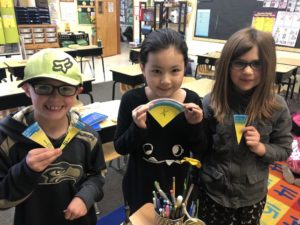
Creating our fraction garden!
This week we began working with fractions!
Our objectives were:
- read, write, and identify fractions of wholes with more than 4 parts
- identify numerator and denominator
- Use models, a number line, multiplication, and division to identify and find equivalent fractions
- write fractions in simplest form
- compare and order fractions
- show fractions as points or distances on a number line
- compare and order fractions using benchmark fractions
Students took home a review packet this is NOT HOMEWORK, but should be completed for at home reinforcement. Don’t forget to do some Khan over break as well!
History & Geography
Social studies with Ms. Marci
This week we in our unit on Native Americans: Regions and Cultures we read about the Native Americans from the regions of the Southeast and Arctic/Subarctic region. The class continued to take notes and work on vocabulary. On Thursday students were assigned their tribe for this units project. They will be responsible for working on a 5 paragraph research paper about their tribe relying on notes, the internet, and books. At home they will either create a replica of their tribes dwellings or clothing. We will be sharing these on Native American Day in class, date to still be determined.
Our objectives were to:
• explain how old the Cherokee and Inuit adapted to their environment and how this environment contributed there cultural identity
• explain that NativecAmericans still live throughout North America
• locate the Southeast and Arctic/Subarctic region of North America on a map and describe some of its physical characteristics
• describe the various food sources and dwelling of the Cherokee and Inuit as related to their environment
• describe some characteristics of Cherokee and Inuit culture, including religious belief
• describe the roles and areas of authority of both men and women in Cherokee Society
• identify the Thule as the group with which the Inuit people merged
• explain why the Southeast was the most densely populated region
• explain the importance of domesticated animals in the Inuit culture
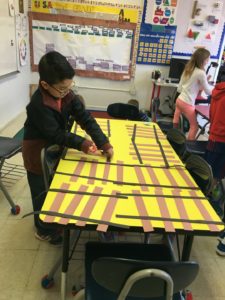
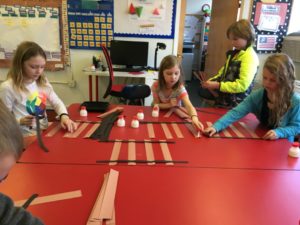 Social Studies with Ms. Laura
Social Studies with Ms. Laura
We talked about the Mountain Men and travel on The Oregon Trail to the Pacific Ocean. We discussed the California Gold Rush and the many people, miners and businessmen (including Levi Strauss) who went to California to make their fortunes! We talked about the Pony Express and the telegraph … even practiced deciphering words written in code! We discussed the building of the Transcontinental Railroad, and we made some track and read through a play about striking The Golden Spike. Have a wonderful vacation!
Science
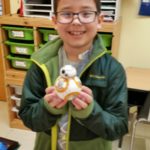
Sharing a robot with the K/1 class
This week in our science domain we read about constellations and the Big Bang Theory. We did a demonstration in class about how the big Bang Theory worked using a balloon. We read, analyzed, and began to memorize the poem escape at bedtime by Robert Lewis Stevenson.
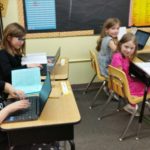
Publishing our space poems.
Our objectives were to:
• describe the characteristics of stars
• comparing contrast our sun in other stars
• describe a galaxy as a very large cluster of many stars
• identify the Milky Way as our own galaxy and Andromeda as the closest spiral galaxy in our universe
• explain what constellations are and how they are useful
• recognize important constellations in the hemisphere that we live in
• describe the universe as a vast space that extends beyond the imagination
• describe tools and methods used to study space and share information
• identify and use vocabulary important to the process of science
• explain the Big Bang Theory as an important scientific theory of the origin of the universe
English Word Work
Spelling groups got their new sorts on Monday and had a spelling test on Friday. In our journals we used the word of the week “plead” in one entry and wrote a space poem in another. For grammar this week we worked on subject and predicate.
Specialists
ART with Mrs. Kelly:
Our artistic goals for March were:
- Reviewing “Tar Beach,” the book and the quilt, by Faith Ringgold, and practicing drawing figures.
- Observing beautiful handmade quilts that Alora’s grandmother made, one with symmetrical patterns and one with an asymmetrical rainbow pattern.
- Observing, drawing, and painting real daffodil plants without pencils and erasers (illustrating Wordsworth’s famous poem)
- Learning how to use simple Origami shapes to create symmetrical (and some asymmetrical) quilt patterns.
Many thanks to Lucas’s mom Amber and Alora’s mom Stacy for cutting HUNDREDS of 3” squares for the students to use in their Origami project!
These students always work very hard and create such amazing artwork! Their neon Origami quilt designs are on the bulletin board at school.
Everyone have a wonderful spring break!
by Jill & Sarah | Mar 24, 2018 | In The Loop
Literatura
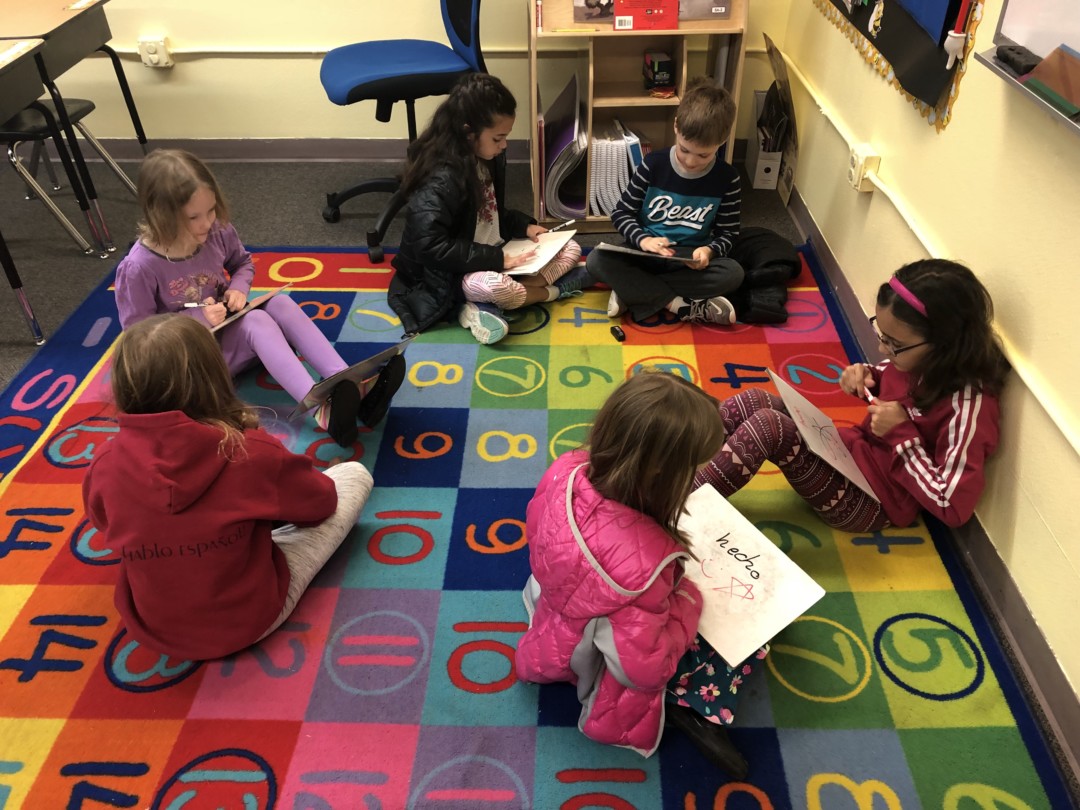 This week we read Un abrigo nuevo para Ana.
This week we read Un abrigo nuevo para Ana.
Our objectives were:
• reader review
• understand meanings of new vocabulary words
• understand how word families have the same root word with different suffixes and prefixes
• understand that prepositions indicate the position or direction
• understand that prepositional phrases begin with a preposition and end with a noun or pronoun
- use comprehension strategies such as summarizing, and predecting to constrct meaning from the text during our first read
Matemáticas
This week we learned about bar graphs and line plots.
Our objectives were:
• Make bar graphs with scales using data in picture graphs and tally charts
- read and interpret data from bar graphs
• Solve problems using bar graphs
- Make a line plot to represent and interpret data
Our next unit will be fractions!
History & Geography
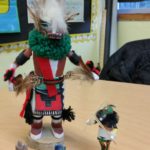 Social studies with Ms. Marci
Social studies with Ms. Marci
This week in our unit on Native Americans: Regions and Cultures we read about the Native Americans from the regions of the Southwest and Northeast. The class used their creative ability and created their own Kachinas. We spent quite a bit of time taking notes and finding definitions for vocabulary terms from this unit. Everyone worked extra hard listening for important important information from the read aloud.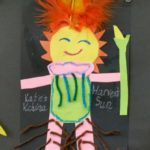
Our objectives were to:
• explain how the Hopi and Iroquois adapted to their environment and how this environment contributed to their cultural identity
• explain that Native Americans still lived throughout North America
• locate the Southwest and Northeast region of North America on a map and describe some of their physical characteristics
• describe the various food sources and dwellings of the Hopi and Iroquois as related to their environment
• describe some characteristics of the Hopi and Iroquois culture, including religious beliefs
• describe kachinas and their significance to the Hopi culture
• explain the significance of the winter and summer solstice to the Hopi culture
• explain why the Iroquois nation was formed
• explain that many families live together in a longhouse and that a young married couple with live with a white family
• identify what the “three sisters” were – beans, corn, and squash
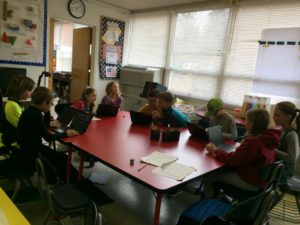
Researching on our Chromebooks.
Social Studies with Ms. Laura: We reviewed our unit about The War of 1812, took a short assessment, enjoyed some typical foods of that time, beans and corn, and re-read our readers’ theater play “The Star Spangled Banner”. We stared our new unit, Americans Move West, by creating a timeline spanning 140 years. We discussed, and explored on the Chrome Books, early ways to travel west, with waterways helping travelers and mountains causing difficulties. We will discuss the building of The Erie Canal.
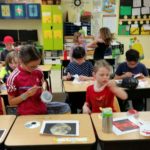 Science
Science
This week in our science domain we read about gravity and how it effects everything in our universe. We did a gravity experiment and had fun painting planet night lights. The class did a great job of identifying characteristics of their planet and incorporating them into their painting.
Our objectives were to:
• identify and describe our solar system as the sun and all of the smaller bodies that orbit it, e.g., the planets, moons, asteroids, etc
• identify that the Andromida Galaxy as the closest spiral galaxy in our universe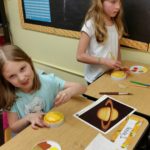
• describe gravity
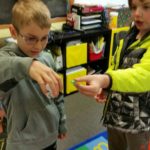
Gravity experiment
• describe the effects gravity has on Earth, within the solar system, and in the universe
English Word Work
Spelling groups got their new sorts on Monday and had a spelling test on Friday. For grammar we looked at prepositions and prepositional phrases. In our journals we used the word of the week “throng” in one entry and wrote about the saying “cold shoulder” in another.
by Jill & Sarah | Mar 17, 2018 | In The Loop
Literatura
This week we read Roxaboxen. Our objectives were:
- to use comprehension strategies such as asking questions and making connections to construct meaning from the text
- to use the comprehension skill Author’s Point of View as we read the story the second time
- students will demonstrate their understanding of grammar, vocabulary, and writing that was studied during this unit on the unit assessment
Next week we will begin our new unit Dinero!
Matemáticas
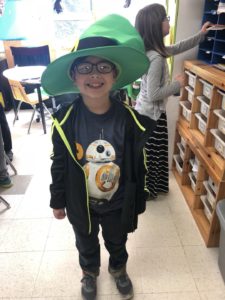
St. Patrick’s Day fun!
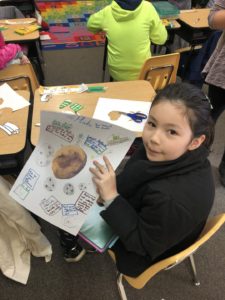
Showing off Science poster!
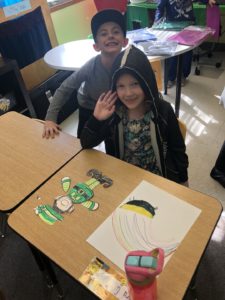
St. Patrick’s Day fun!
This week we continued working on Real-World Problems with Measurement. Our objectives were:
- draw bar models to solve two-step measurement problems
- choose the operations to solve problems
- write and solve two-step measurement problems
- show mastery and understanding of using bar models to solve measurement problems involving one or two steps on the chapter test
Next week we will begin our new chapter Bar Graphs!
History & Geography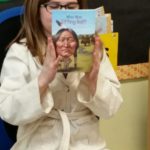
Social studies with Ms. Marci
This week we continued unit on Native Americans: Regions and Cultures. We read about the Mississippian Mound Builders and the Ancestral Pueblo Native Americans. The students had a chance to do some research on the Chromebooks about these two groups. Kate and Della shared some items and information about Native Americans and how these things related to their own history.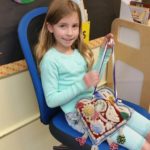
Our objectives were to:
• explain how Native Americans adapted to their environment and how these environments contributed to their cultural identity
• explain that Native Americans still lived throughout North America
• locate on a map of North America the Mississippi River and surrounding areas where Mound Builders lived
• identify three of the groups of Native Americans that are referred to as Mound Builders: Adena, Hopewell, and Mississippian
• describe the various food sources and dwellings of the Mound Builders as related to their environment
• describe some characteristics of the Mound Builders cultures, including their religious beliefs
• locate the southwest region of North America on a map and describe some of the physical characteristics
• describe the various food sources and dwellings of the Ancestral Pueblo as related to their environment
• describe some characteristics of the Ancestral Pueblo cultures, including religious beliefs
• explain that the Ancestral Pueblo left their homes quite suddenly, migrated to new areas in the same region, and establish new settlements, some of which still exist today
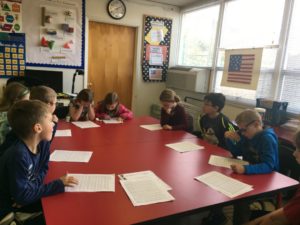 Social studies with Ms. Laura
Social studies with Ms. Laura
We debated whether or not young America should declare war on Great Britain. President James Madison DOES declare war. We talked about James and Dolley Madison and we worked together to prepare skits about what happened when the British burned the President’s House (now The White House). We read an historical novel, An American Army of Two by Janet Greeson. We learned aboaut Andrew Jackson’s role in the final battle of the war. We all participated in a readers’ theater play about the Battle of Baltimore and the writing of “The Star Spangled Banner.”
Science
This week in our science domain, Astronomy, we finished our research projects. The students really impressed me with their ability to work together and come up with some very creative posters. In our read aloud we read about the galaxies.
Our objectives were to:
• identify the sun as a constant source of heat and light energy
• classify the sun as a star
• identify our planet earth as the third planet from the sun and ideally suited for
• describe the characteristics of a planet
• describe the eight planets of our solar system and their sequence from the sun
• identify our solar system as a son and all the smaller bodies that orbit it, e. g., the planets, moons, asteroids, etc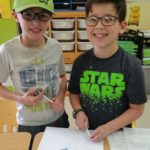
• describe stars as hot, distance, and made of gas
• describe a galaxy as a very large cluster of many stars
• identify the Milky Way as our own Galaxy in a drama as the closest spiral galaxy in our universe
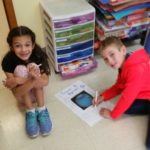 • describe the universe as a vast space that extends beyond the imagination
• describe the universe as a vast space that extends beyond the imagination
English Word Work
Spelling groups got their new sorts on Monday. Because of the short week they will have their spelling test this following Monday, spelling homework is due at this time as well. In our journals we used the word of the week “prank”. I think several used this opportunity to plan something special for April Fool’s day.
by Jill & Sarah | Mar 10, 2018 | In The Loop
Literatura
This week we read El traje nuevo del el emperador. Our objectives were:
- complete Dr. Seuss writing activity
- review reader homework checking that words are in the correct category as well as finding the definition for some of the unknown words
- to use comprehension strategies such as Asking Questions, Predicting and Visualizing to construct meaning from the text
- to use the comprehension skill Classify and Categorize as we read the story the second time
- understand the meaning of our new spelling words
- understand how to combine short sentences to create longer and more fluid sentences
Matemáticas
This week we took our Metric Measurement test and began Chapter 12: Word Problems: Measurement. Our objectives were:
- demonstrate understanding and mastery of the use of metric units to measure length, mass, and volume
- Draw bar-models to solve one-step and two-step measurement problems
- choose the operation to solve one-step and two-step measurement problems
We have been struggling with word problems so some kiddos have brought home math packets with a “Please finish and return stamp” and a date for reinforcement. Students should complete the packet by the date and return it to class.
History & Geography
Social studies with Ms. Marci
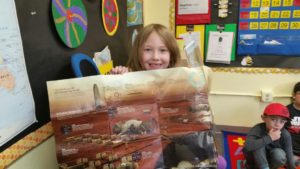 This week we began our next unit on Native Americans:Regions and Cultures. In this domain students will review what they’ve learned in previous grades about the first known inhabitants of North America. They will learn more in-depth information about how some Native Americans first migrated from Asia to North America, how they spread throughout the continents of North America and South America, and how their ways of obtaining food changed over the years. Students will learn about how people adapted to the environment of the region they settled and how this shaped their cultural identity.
This week we began our next unit on Native Americans:Regions and Cultures. In this domain students will review what they’ve learned in previous grades about the first known inhabitants of North America. They will learn more in-depth information about how some Native Americans first migrated from Asia to North America, how they spread throughout the continents of North America and South America, and how their ways of obtaining food changed over the years. Students will learn about how people adapted to the environment of the region they settled and how this shaped their cultural identity.
Our objectives were to:
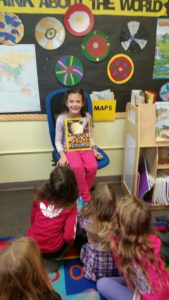 • locate the continents of North America, South America, and Asia on a map
• locate the continents of North America, South America, and Asia on a map
• locate the Bering Strait on a map, and explain that during the Ice Age, this region was an exposed landmass known as Beringia that connected Asia and North America
• Explain how and why nomadic Hunters migrated from Asia to North America
• explain that the ways Native Americans obtain food evolved over time to include hunting, gathering, and in some areas, fishing and farming
• explain that Native Americans spread out across North and South America in search of food and eventually developed different languages and cultures
• describe the importance of trade in the development of farming techniques
• describe the way in which Native Americans handed down their history from one generation to another, compare this to other groups that we have learned about
• explain why native people came to be called “Indians”
• explain that Native Americans still lived throughout North America
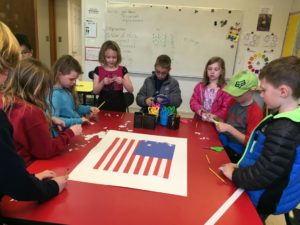
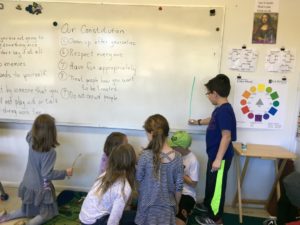 Social studies with Ms. Laura
Social studies with Ms. Laura
We completed our unit on The Constitution with a review, an assessment and the writing of our class constitution. We started our new unit, The War of 1812, by examining the causes and the actual events leading up to 1812. The students worked together to prepare skits illustrating some of the problems America was having in dealing with the British and the Native Americans.
Science
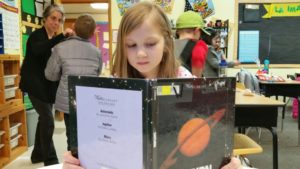 This week in our science domain, Astronomy, we worked on our research project in groups, gathering information on a planet from books and the computers. In our read aloud our focus was on the solar system. We had a great class discussion about eclipses, and discussed how learning about space can be a lifetime journey.
This week in our science domain, Astronomy, we worked on our research project in groups, gathering information on a planet from books and the computers. In our read aloud our focus was on the solar system. We had a great class discussion about eclipses, and discussed how learning about space can be a lifetime journey.
Our objectives were to:
• identify the sun as a constant source of heat and light energy
• classify the sun as a star
• identify our planet earth as the third planet from the sun and ideally suited for
• describe the characteristics of a planet
• describe the eight planets of our solar system and their sequence from the sun
• describe stars at hot, distant, and made of gas
• compare and contrast asteroids, meteoroids, and comets
English Word Work
Spelling groups got their new sorts on Monday and had a spelling test on Friday. In our journals we used the word of the week “flawless” in one entry and students used metaphors or similes in another.
For grammar we continued to work on metaphors, similes, and personification in writing.
Specialist
This month in Character Ed we are talking about how to “take personal interest in others”. I’m encouraging kids to do this by asking questions and offering compliments to their family, friends, teachers, and acquaintances. Questions like, “how was your day today, mom?” or “what are you doing this weekend?” can help kids take the focus off themselves for a moment and become more engaged with the people around them. To go along with this, our quote of the month is “The true secret of happiness lies in taking a genuine interest in all the details of daily life.” When we take notice of others around us, we become less self-centered and more compassionate, tolerant, and empathetic. And then of course, with spring around the corner, we can also take notice of the beautiful details of new life all around us. To celebrate spring, we are reading The Daffodils, the famous poem by William Wordsworth and discussing the rich language Wordsworth uses.
-In 2nd/3rd grade, we began reading a chapter book called 100 Dresses, which I started last year but never finished. We started from the top and this book will give us a great opportunity to talk about tolerance, empathy, integrity among other important topics.
 This week we read Cuatro dólares y cincuenta centavos. Our objectives were:
This week we read Cuatro dólares y cincuenta centavos. Our objectives were:
 History & Geography
History & Geography

 Social Studies with Ms. Laura We completed our unit on The Civil War with a review, assessment and a reading play. We also ate some food, similar to what soldiers might have consumed. Luke Wagner, from the four/five class, brought some items from his Civil War collection and spoke to us about life as a soldier and about several battles. We asked him many questions and appreciated his expertise! We started our unit on Immigration and Citizenship, talking about the reasons why people immigrated to the United States in the 1800s and 1900s. We worked on posters ‘advertising’ the great aspects of life in America.
Social Studies with Ms. Laura We completed our unit on The Civil War with a review, assessment and a reading play. We also ate some food, similar to what soldiers might have consumed. Luke Wagner, from the four/five class, brought some items from his Civil War collection and spoke to us about life as a soldier and about several battles. We asked him many questions and appreciated his expertise! We started our unit on Immigration and Citizenship, talking about the reasons why people immigrated to the United States in the 1800s and 1900s. We worked on posters ‘advertising’ the great aspects of life in America. Science
Science




 This week we completed our second book report!
This week we completed our second book report!
 This week we finished our measurement chapter.
This week we finished our measurement chapter. Social Studies with Ms. Laura We continued our discussion about Civil War battles and the end of the war, with Lee’s unconditional surrender to Grant. We talked about Lincoln’s assassination and how the North treated the South after the war. We discussed the meaning of Grant’s famous quote: “The war is over. The rebels are our countrymen again.” We made stick figures of some people important in the Civil War and start practicing a short play. Our review and assessment will be on Tuesday, May 8th.
Social Studies with Ms. Laura We continued our discussion about Civil War battles and the end of the war, with Lee’s unconditional surrender to Grant. We talked about Lincoln’s assassination and how the North treated the South after the war. We discussed the meaning of Grant’s famous quote: “The war is over. The rebels are our countrymen again.” We made stick figures of some people important in the Civil War and start practicing a short play. Our review and assessment will be on Tuesday, May 8th.




 This week we read La cancion del zapatero.
This week we read La cancion del zapatero.








 Art with Ms. Kelly: We spent the month of April working on a Weaving Project for a Mother’s Day gift. This project
Art with Ms. Kelly: We spent the month of April working on a Weaving Project for a Mother’s Day gift. This project This week we read ¡Los niños lo lograron en los negocios!
This week we read ¡Los niños lo lograron en los negocios!
 This week we finished our chapter on fractions and began our new chapter Customary Measurement.
This week we finished our chapter on fractions and began our new chapter Customary Measurement.


















 This week we read Un abrigo nuevo para Ana.
This week we read Un abrigo nuevo para Ana. 


















